
Alternative Social Media
The Role of Alternative Social Media in the News and Information Environment
Free speech ideals and heated political themes prevail on these sites, which draw praise from their users and skepticism from other Americans
BY , , , , , , , AND
In recent years, several new options have emerged in the social media universe, many of which explicitly present themselves as alternatives to more established social media platforms such as Facebook, Twitter, and YouTube – especially by opposing free speech restrictions they say are rife at those sites.
These newer sites have created a small but satisfied community of news consumers, many of whom say one of the major reasons they are there is to stay informed about current events, according to a new Pew Research Center study. The study included a survey of U.S. adults along with an audit of seven alternative social media sites – BitChute, Gab, Gettr, Parler, Rumble, Telegram, and Truth Social – and a detailed analysis of prominent accounts and content across them.
Although fewer than one-in-ten Americans say they use any of these sites for news, most who do say they have found a community of like-minded people there. And news consumers on the four sites with large enough numbers to be analyzed individually – Parler, Rumble, Telegram and Truth Social – largely say they are satisfied with their experience getting news on the sites, that they find the information there to be mostly accurate, and that the discussions are mostly friendly.
At the same time, however, the study finds signs that these sites may be another symptom of the increasingly polarized public discourse – and Americans’ partisan divisions in the broader news media environment.
A majority of those who regularly get news from at least one of the seven alternative social media sites (66%) identify as Republicans or lean toward the Republican Party, in contrast with the news consumers on more established social media sites, who largely identify as Democrats or lean Democratic. And this trend is common among prominent accounts as well, with about a quarter of these accounts (26%) identifying as conservative or Republican or supportive of former President Donald Trump or his “Make America Great Again” movement. In addition, many prominent accounts express other values such as patriotism and religious identity.
Several sites are linked to conservative backers – including Truth Social, which was launched by Trump about a year after he was “indefinitely” and “permanently” suspended from Facebook and Twitter. This is not a unique phenomenon: The study found a noteworthy percentage of prominent accounts on these seven newer sites (15%) have been banned or demonetized elsewhere on social media.
Perhaps connected to that, Americans who have heard of these sites but do not use them as sources for news are skeptical of them. When asked for the first thing that comes to mind when thinking about alternative social media sites, people in this category commonly cite inaccuracy and misinformation, political bias and the political right, and extremism and fringe ideas.
Other elements of the study speak to some of these associations. A small but measurable share of prominent accounts across these sites (6%) mention a connection to the set of conspiracy theories known as QAnon. And an analysis of recent content posted by prominent accounts on these sites finds that the most common phrases include some that are controversial and even inflammatory such as wariness toward vaccines and negative associations with LGBTQ people. Moreover, one of the most prevalent destinations for links found in these posts is The Gateway Pundit, a digital outlet that has been criticized for publishing false information.
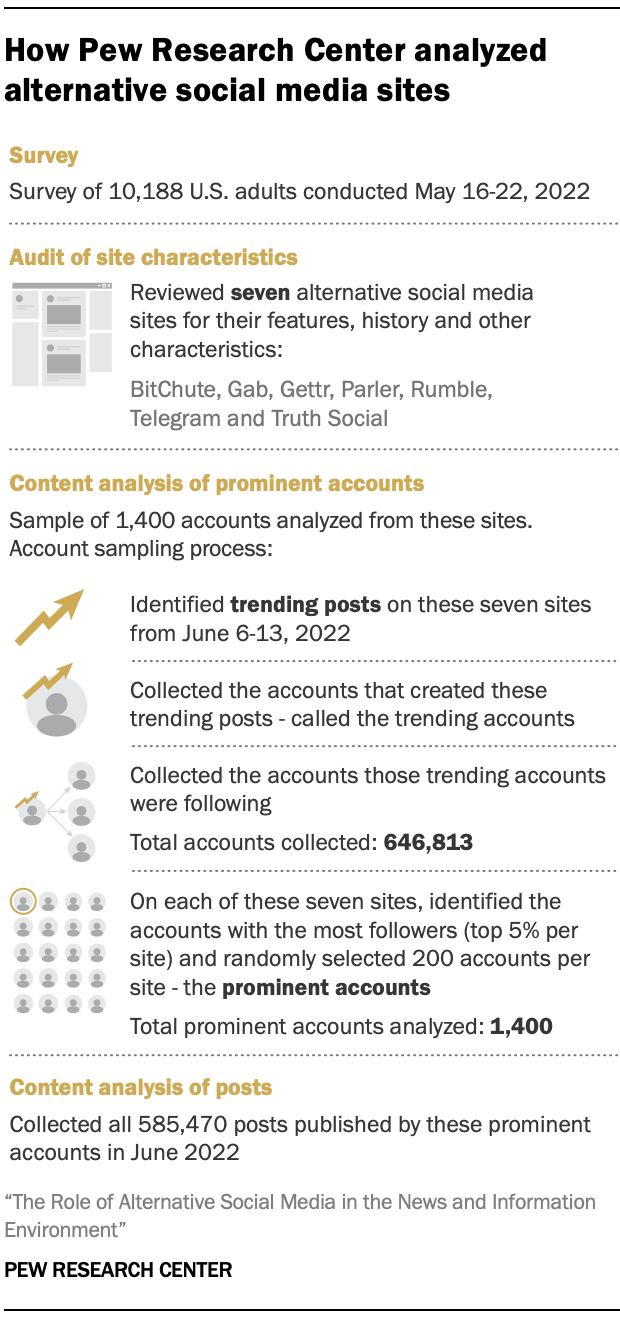
These are some of the key themes to emerge from this major new study, which was designed to look at multiple aspects of the world of alternative social media. It examines those who turn to these sites for news, explores how the sites present themselves, and reports on the kinds of accounts that draw the most attention and the types of conversations taking place there.
For the first component, researchers conducted a survey of news consumers on seven sites: BitChute, Gab, Gettr, Parler, Rumble, Telegram and Truth Social. Four of these – Parler, Rumble, Telegram and Truth Social – had enough news consumers to do a deeper dive.
Next, researchers conducted an audit of all seven sites that explored elements of how the sites present themselves, privacy features, and other characteristics. Researchers then analyzed 200 prominent accounts sampled from those with the highest number of followers on each of these sites. They examined these 1,400 accounts for several attributes, including how they describe themselves in their profiles. Finally, researchers collected all 585,470 posts published by these accounts in June 2022 and examined their key phrases, themes and the links included in the posts. For more details, see the methodology. The rest of this overview discusses the key findings of the study in more detail.
Alternative social media sites have small, largely Republican audiences; prominent accounts tend to emphasize right-leaning identities and religious and patriotic values
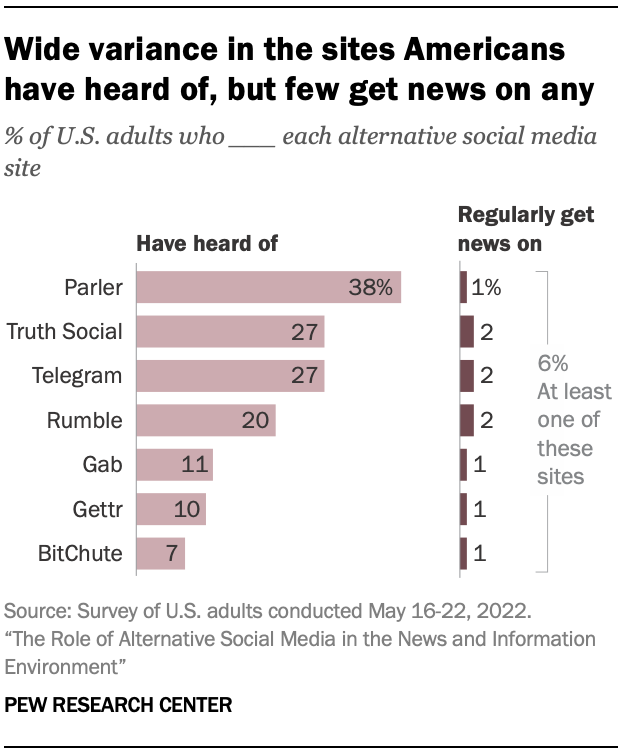
These sites have become a refuge for some who feel they do not have a home on the more established sites.
Still, relatively few Americans use these alternative social media sites for news – though larger portions have heard of each of them. Parler is the best known of the seven sites named in the survey, with 38% of U.S. adults saying they are familiar with it. The share who get news on these sites is much smaller: Just 6% of Americans get news from at least one of the seven sites mentioned, and no single site is used for news by more than 2% of U.S. adults.
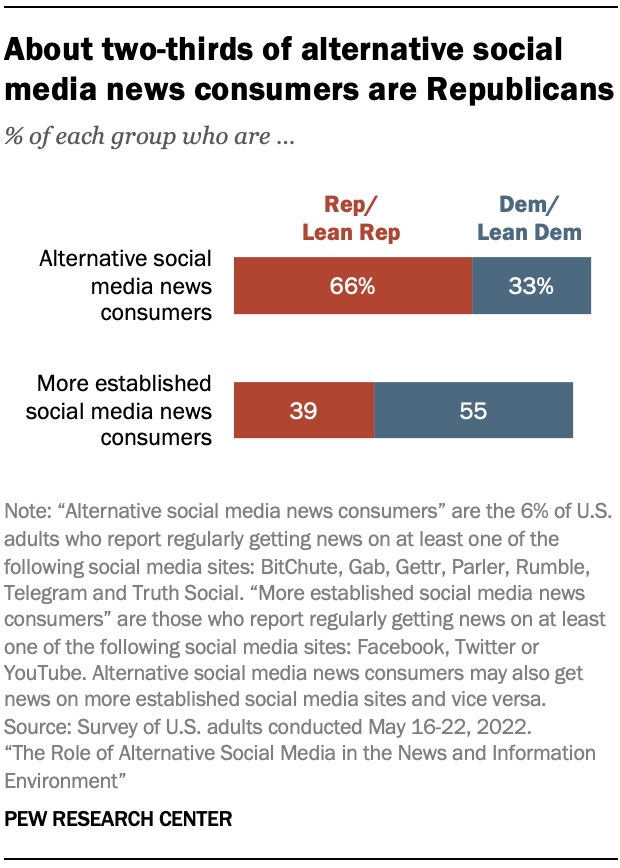
The news consumers on these sites lean heavily Republican. A majority of those who get news from at least one of the seven alternative social media sites (66%) are Republican or lean Republican. This is in contrast with more established social media sites, where news consumers are more likely to be Democrats or lean Democratic. (For more about news consumers on these more established sites, read our Social Media and News Fact Sheet.)
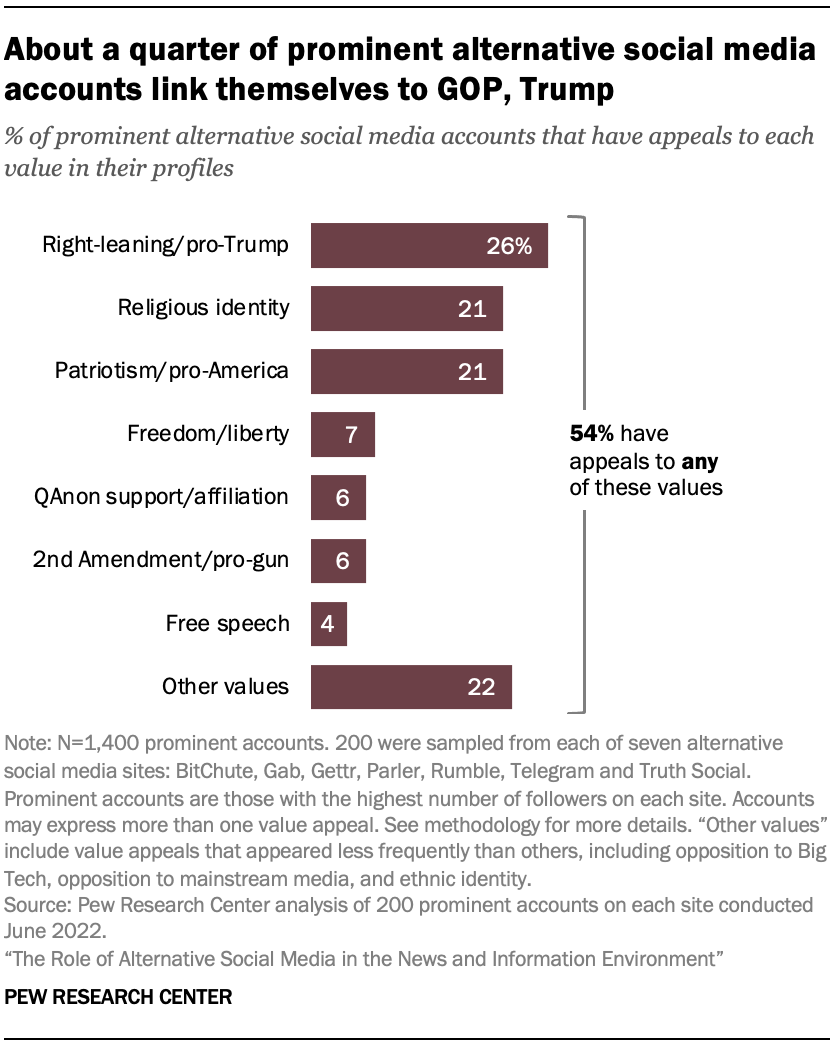
This report also looks at a sample of 200 of the prominent accounts on each site – those with the greatest number of followers – to determine what kinds of accounts tend to gain the most traction on alternative social media.
Roughly half (54%) of prominent accounts appeal to some kind of value or political orientation in their profiles. The most common of these values was right-leaning – 26% of prominent accounts expressed some kind of right-leaning or pro-Trump appeal – more of which centered around Trump or his “Make America Great Again” movement than with the Republican Party or conservative ideology.
Other expressed values included appeals to a religious identity (21% of prominent accounts), patriotism/pro-America views (21%), freedom and liberty (7%), pro-gun or pro-Second Amendment positions (6%), and support for the set of conspiracy theories known as QAnon (6%).
A close look at who is behind the prominent accounts shows that about eight-in-ten (83%) are run by individuals. That can mean either a single person with a noted affiliation to an organization or one without any organizational affiliation. Another 12% are organizations, including news organizations, nonprofit groups and others.
Along with a prevalence of conservative values and identities in prominent account profiles, political topics were common in the content posted there. This study collected all posts published by the 1,400 prominent accounts in June 2022 and identified those that were about five politically oriented topics: abortion; guns, gun control and shootings; the Jan. 6, 2021, attack on the U.S. Capitol and subsequent congressional hearings; LGBTQ issues; and vaccines.
The discussion around these issues often reflects fringe and controversial world-views on the political right. For instance, some of the most common terms in posts about the Jan. 6 attack on the U.S. Capitol include “political prisoner,” “DC gulag,” “unselect committee,” “witch hunt” and “sham hearing.” Meanwhile, posts about vaccines indicate a deep and consistent concern about the impact of vaccination. These posts regularly refer to a small group of influential vaccine skeptics. The most common terms in these posts point to a widespread fear of real but rare impacts of vaccination (“side effect,” “adverse reaction,” “blood clot,” “heart inflammation”) but also diseases or symptoms for which the medical literature finds little evidence of being tied to vaccines (“[sudden adult] death syndrome,” “sperm count”). And posts about LGBTQ issues commonly referred to drag queen “story hour” (a common target of anti-LGBTQ groups) or derisive allegations toward gay and transgender individuals, such as “pedo” and “groomer,” implying that they prey on children. See Appendix C.
Most alternative social media news consumers feel a sense of community on these sites, which prominently identify themselves as havens of free speech
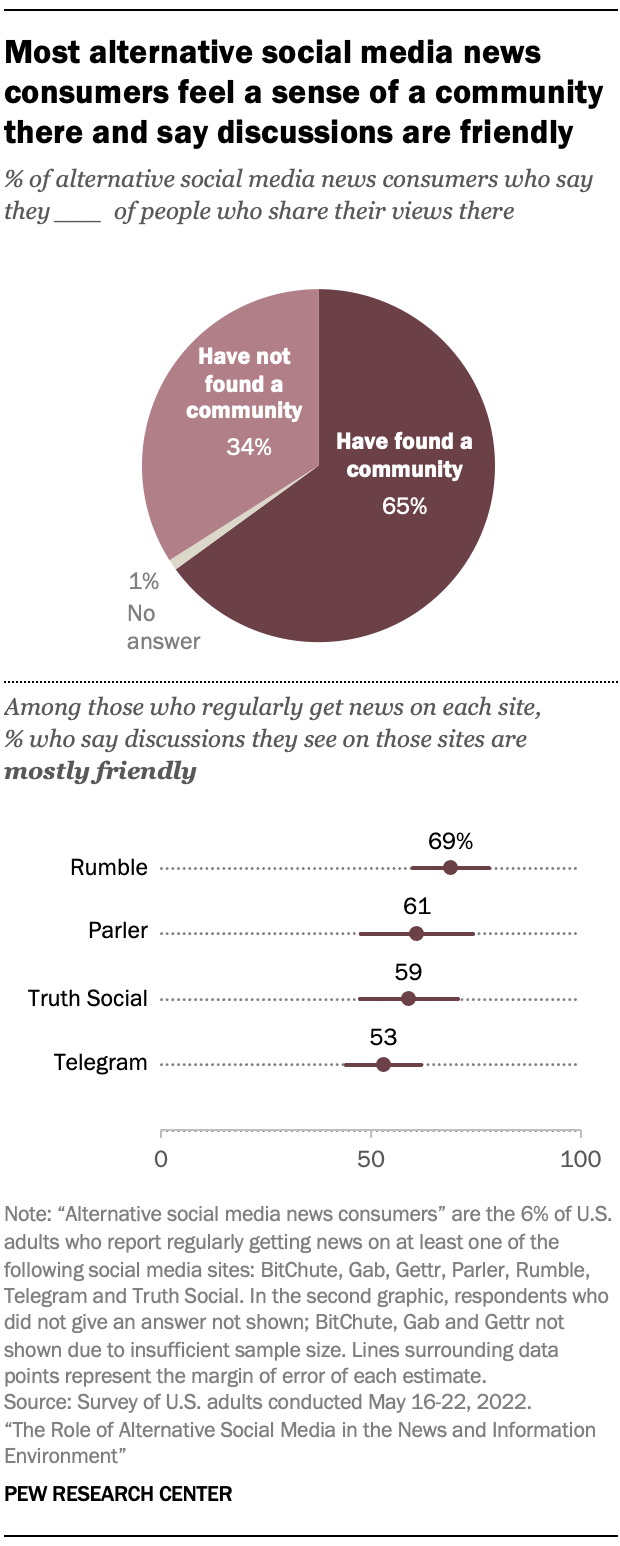
About two-thirds of individuals who get news on at least one of the seven alternative social media sites (65%) say they have found a community of like-minded people there.
In a related finding, those who get news from Rumble, Parler, Truth Social and Telegram are far more likely to see these spaces as friendly than unfriendly. About half or more of those who get news on each of them – ranging from 53% to 69% – characterize the discussions they see on these sites as mostly friendly, while no more than a third of each site’s news consumers say the conversation there is mostly unfriendly (the rest say conversation is about an equal mix of friendly and unfriendly).
In some cases, the activity on these sites moves beyond the digital realm. One-third of alternative social media news consumers (33%) say they have participated in an in-person political rally or other political activity they learned about on these sites, and a similar share (36%) have donated money to accounts they follow on these sites.
A central way these sites depict themselves, one that may help give users that sense of community, is as welcoming havens for free speech as well as antidotes to the censorship and “cancel culture” they say exist on more established social media sites. Indeed, all of the seven sites examined explicitly state that they support free speech.
That message has clearly resonated with those turning to those sites for news. When users of alternative social media sites were asked to describe, in their own words, the first thing that comes to their mind in connection with these sites, 22% mentioned something related to the concept of freedom of speech, anti-censorship and an alternative to more established social media – far more common than any other type of response.
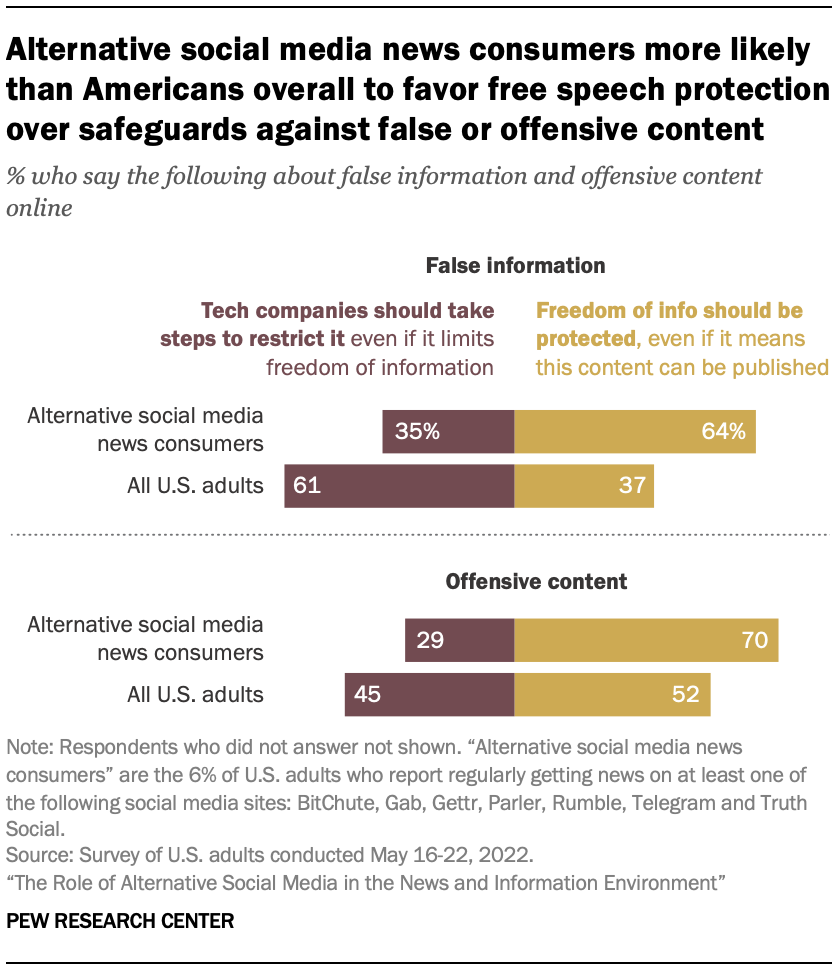
Alternative social media news consumers are particularly supportive of these concepts. Compared with Americans overall, alternative social media news consumers are more likely to say that freedom of information should be protected – even if it means allowing false information and offensive content online – than they are to say technology companies should take steps to restrict false information. For example, nearly two-thirds of alternative social media news consumers (64%) favor the protection of free speech even if it brings with it some false content, while the majority of all U.S. adults (61%) prefer that tech companies take steps to restrict this kind of content even if it limits freedom of information.
15% of prominent accounts on alternative social media sites were banned elsewhere
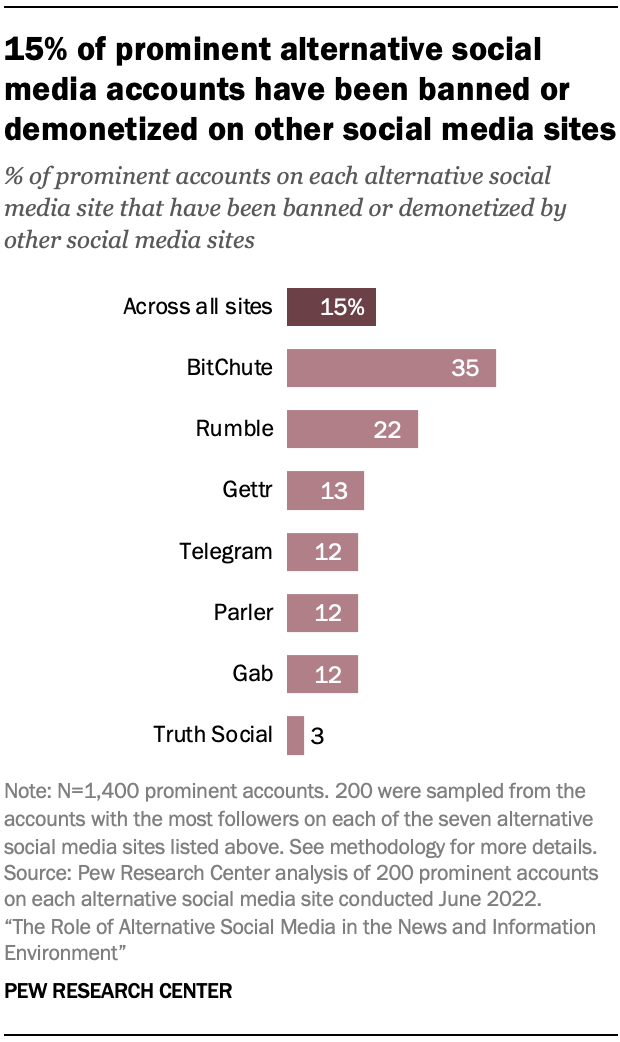
The free speech philosophies of these alternative social media sites have attracted some user accounts that were banned elsewhere. This may be connected to the perception among Americans who are aware of these sites but don’t get news there that the sites host misinformation.
Indeed, 15% of prominent accounts across the seven sites, including Trump’s account, have been indefinitely or permanently suspended, banned or demonetized on more established social media. This is particularly common on BitChute, a video-focused site, where about a third of prominent accounts (35%) have been banned or demonetized elsewhere.
In a number of cases the banning or demonetization was based on evidence that they had spread misinformation and inaccurate information (one example being COVID-19 vaccine skeptic Dr. Robert Malone).
That perception clearly exists among the larger segment of the public that does not use these alternative social media sites for news. When asked to name the first thing that comes to mind when they think of alternative social media sites, adults who have heard about these alternative social media sites but do not get news on them most commonly voice thoughts of inaccuracy and misinformation: 16% of responses. Another 11% of these U.S. adults cite political bias or associate the sites with the political right, and 6% associate alternative social media with extremism or consider them dangerous. Those who get news on these sites are less likely to mention these ideas and more likely to associate them with a lack of censorship or as alternatives to Big Tech.
The content on these sites also raises some questions about the credibility of the information found there. In June 2022, the most prominent accounts commonly linked to digital-only outlets such as The Gateway Pundit, Rebel News, Zero Hedge and Breitbart – each of which have been banned or demonetized by technology companies or other social media sites for misinformation or hate speech. Overall, during this period, there was a clear preference for material from other social media (45% of links) and relatively new, digital-only news sites (20%) rather than legacy news organizations like print publications (4%), radio or podcast sites (1%) or television (1%) sites. In fact, the same share of links went to The Gateway Pundit as to all print publications combined (4%).
Almost all alternative social media sites studied moderate content to some extent and also give users the option to do so
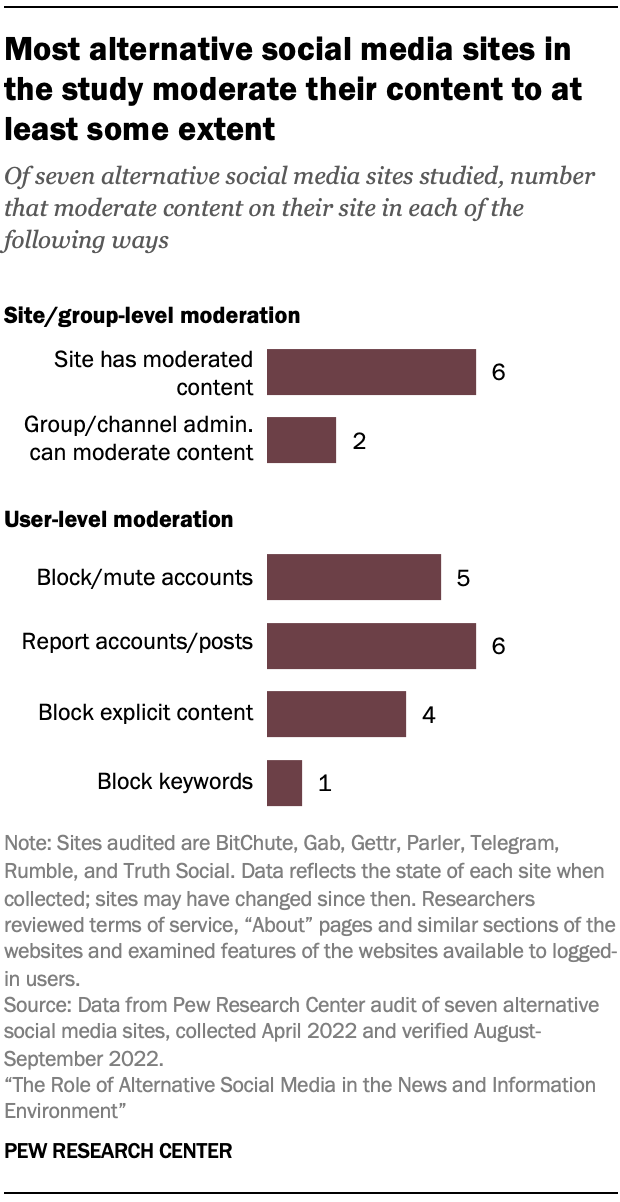
Notwithstanding their allegiance to free speech, almost all of the sites analyzed have at least some restrictions on content.
Every one of the sites, with the exception of Gab, moderates user content beyond the existing legal requirements to remove illegal content and cooperate with law enforcement requests.1 In some cases, sites have agreed to certain restrictions due to outside pressure from governments or mobile app stores like Apple’s App Store or the Google Play Store. This moderation includes removing posts that may contain violent, racist or offensive content and, in some cases, for the political viewpoint expressed.
In addition, almost all these sites give their users options to control the content they see. Five sites let users block or mute other users from their news feed, six sites let users report either accounts or posts, and four of the sites allow users to block explicit content.
Alternative social media news consumers largely satisfied with news they find there, which is often government and political news they wouldn’t have seen elsewhere
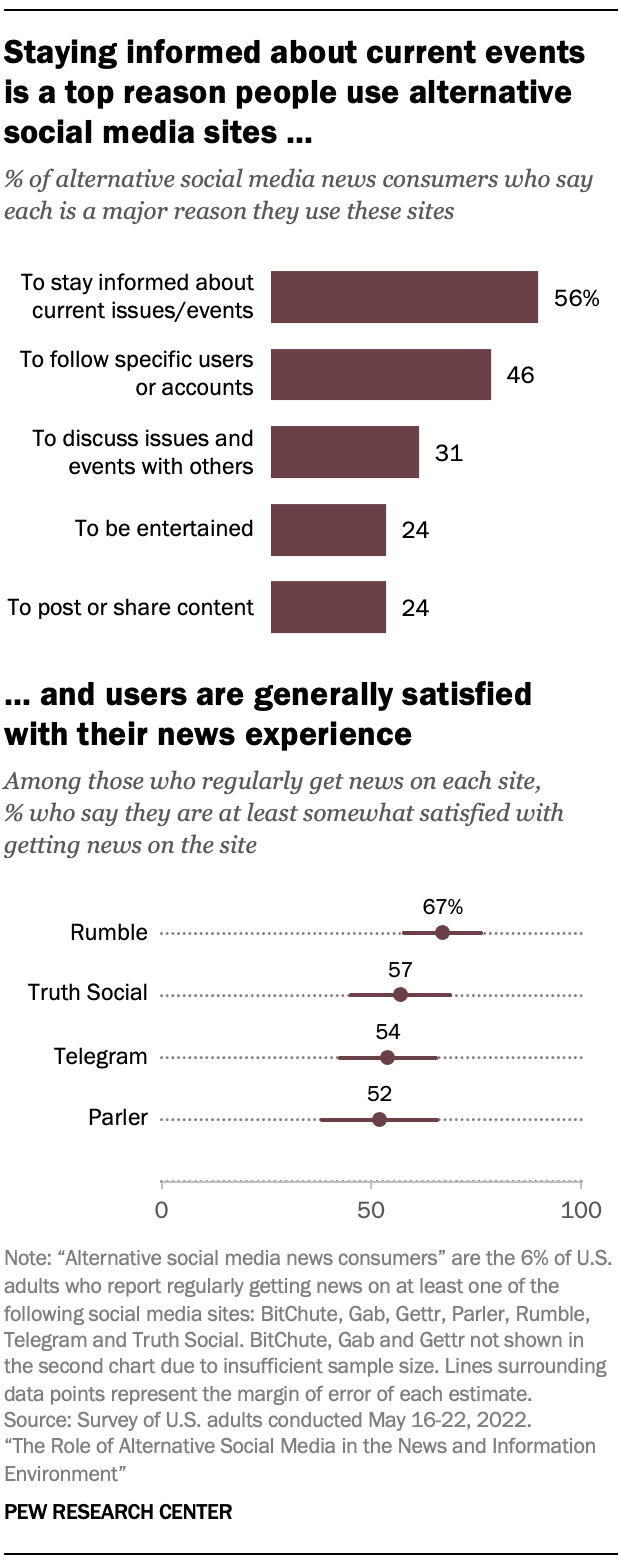
For many users, these sites are an important source of information about current events – often government and politics news – and they report finding news that they wouldn’t necessarily find elsewhere.
A majority of those who get news on at least one of the seven sites (56%) say a major reason they go to these sites is to stay informed about current events and issues. And much of what they see is government and political news: 52% say this is the most common type of news they come across on these sites.
In general, alternative social media news consumers like their experience there. About half or more of news consumers on Rumble, Truth Social, Telegram and Parler say they are very or somewhat satisfied with the experience of getting news there, and this overall satisfaction extends to their perception of the accuracy of the information they find. Fewer of the news consumers on each of these sites – roughly a quarter or less – say they are dissatisfied with the experience, while the rest say they are neither satisfied nor dissatisfied.
These news consumers also say that much of the news they see on alternative social media sites is information they wouldn’t find elsewhere. Roughly half of news consumers who get news on at least one of the seven sites (52%) say they at least fairly often come across news on these sites that they would not have seen elsewhere, with an additional 32% who sometimes encounter unique news there.

